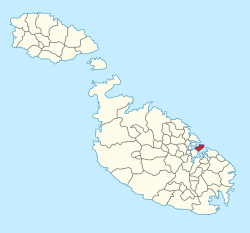Valletta
|
Valletta Il-Belt Valletta Città Umilissima Humilissima Civitas Valletta |
|||
|---|---|---|---|
| City and Local council | |||

From top: Skyline, Saluting Battery, Lower Barrakka Gardens, St. John's Co-Cathedral and the city walls
|
|||
|
|||
| Nickname(s): Il-Belt | |||
 |
|||
| Coordinates: 35°53′4″N 14°30′25″E / 35.88444°N 14.50694°ECoordinates: 35°53′4″N 14°30′25″E / 35.88444°N 14.50694°E | |||
| Country |
|
||
| Region | South Eastern Region | ||
| District | Southern Harbour District | ||
| Established | 28 March 1566 | ||
| Capital city | 18 March 1571 | ||
| Founded by | Jean de Valette | ||
| Borders | Floriana | ||
| Government | |||
| • Mayor | Alexiei Dingli (PN) | ||
| Area | |||
| • City and Local council | 0.8 km2 (0.3 sq mi) | ||
| Elevation | 56 m (184 ft) | ||
| Population (March 2014) | |||
| • City and Local council | 6,444 | ||
| • Density | 8,100/km2 (21,000/sq mi) | ||
| • Urban | 355,000 | ||
| • Metro | 393,938 | ||
| Demonym(s) | Belti (m), Beltija (f), Beltin (pl) | ||
| Time zone | CET (UTC+1) | ||
| • Summer (DST) | CEST (UTC+2) | ||
| Postal code | VLT | ||
| Dialing code | 356 | ||
| ISO 3166 code | MT-60 | ||
| Patron saints |
St. Dominic Our Lady of Mount Carmel St. Paul St. Augustine |
||
| Day of festa | 3 August 10 February |
||
| Website | Official website | ||
| Official name | City of Valletta | ||
| Type | Cultural | ||
| Criteria | i, vi | ||
| Designated | 1980 (4th session) | ||
| Reference no. | 131 | ||
| State Party |
|
||
| Region | Europe and North America | ||
Valletta (/vəˈlɛtə/; Maltese pronunciation: [ˈvɐlɛ.tɐ]) is the capital city of Malta, colloquially known as Il-Belt (IPA: [ˈil.bɛlt]; lit. "The City") in Maltese. Geographically, it is located in the South Eastern Region, in the central-eastern portion of the main island of Malta having its western coast with access to the Marsamxett Harbour and its eastern coast in the Grand Harbour. The historical city has a population of 6,444 (as of March 2014), while the metropolitan area around it has a population of 393,938. Valletta is the southernmost capital of Europe and the second southernmost capital of the European Union after Nicosia.
Valletta contains buildings from the 16th century onwards, built during the rule of the Order of St. John also known as Knights Hospitaller. The city is essentially Baroque in character, with elements of Mannerist, Neo-Classical and Modern architecture in selected areas, though the Second World War left major scars on the city, particularly the destruction of the Royal Opera House. The City of Valletta was officially recognised as a World Heritage Site by UNESCO in 1980.
...
Wikipedia


